- Clone
- 3C10 (See other available formats)
- Regulatory Status
- RUO
- Other Names
- T cell antigen receptor Vα7.2
- Isotype
- Mouse IgG1, κ
- Ave. Rating
- Submit a Review
- Product Citations
- publications
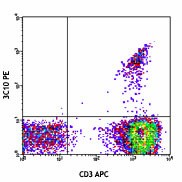
-

Human peripheral blood lymphocytes stained with CD3 APC and TCR Vα7.2 (clone 3C10) PE (top), or mouse IgG1, κ isotype control (bottom). -

| Cat # | Size | Price | Quantity Check Availability | Save | ||
|---|---|---|---|---|---|---|
| 351705 | 25 tests | 117€ | ||||
| 351706 | 100 tests | 249€ | ||||
The 3C10 antibody recognizes the Vα7.2 T cell antigen receptor (TCR) α-chain segment which, joined with the Jα33 segment, constitutes an invariant TCR that is a characteristic of the mucosal-associated invariant T cells (MAIT cells). MAIT cells are restricted by a nonpolymorphic class Ib major histocompatibility complex (MHC) molecule, MHC-related molecule 1 (MR1). MAIT cells are present in human blood (1-8% of T cells), mesenteric lymph nodes, liver, and intestinal mucosa. MAIT cells play a role in detecting and fighting off microbial infections.
Product DetailsProduct Details
- Verified Reactivity
- Human
- Antibody Type
- Monoclonal
- Host Species
- Mouse
- Immunogen
- Recombinant TCR
- Formulation
- Phosphate-buffered solution, pH 7.2, containing 0.09% sodium azide and BSA (origin USA)
- Preparation
- The antibody was purified by affinity chromatography and conjugated with PE under optimal conditions.
- Concentration
- Lot-specific (to obtain lot-specific concentration and expiration, please enter the lot number in our Certificate of Analysis online tool.)
- Storage & Handling
- The antibody solution should be stored undiluted between 2°C and 8°C, and protected from prolonged exposure to light. Do not freeze.
- Application
-
FC - Quality tested
- Recommended Usage
-
Each lot of this antibody is quality control tested by immunofluorescent staining with flow cytometric analysis. For flow cytometric staining, the suggested use of this reagent is 5 µl per million cells in 100 µl staining volume or 5 µl per 100 µl of whole blood.
- Excitation Laser
-
Blue Laser (488 nm)
Green Laser (532 nm)/Yellow-Green Laser (561 nm)
- Application Notes
-
Associated with an anti-CD161 or -IL18Ra staining, the 3C10 antibody allows unequivocal identification of MAIT cells. Importantly, the Va7.2 segment can also be used by conventional T cells. Therefore, the 3C10 also stains a subset of conventional CD4 and CD8 T cells. Additional reported applications (for the relevant formats) include: spatial biology (IBEX)3,4.
-
Application References
(PubMed link indicates BioLegend citation) - Product Citations
-
- RRID
-
AB_10933262 (BioLegend Cat. No. 351705)
AB_10933262 (BioLegend Cat. No. 351706)
Antigen Details
- Structure
- Invariant T cell antigen receptor (TCR) α-chain (iTCRa), composed of the invariant α-chain variable region 7.2 (iVα7.2) segment in humans
- Distribution
-
Mucosal-associated invariant T (MAIT) cells and conventional T cells
- Cell Type
- T cells
- Biology Area
- Adaptive Immunity, Immunology
- Molecular Family
- TCRs
- Antigen References
-
1. Le Bourhis L, et al. 2010. Nat. Immunol. 11:701.
- Gene ID
- 6955 View all products for this Gene ID
- UniProt
- View information about TCR Valpha7.2 on UniProt.org
Related Pages & Pathways
Pages
Related FAQs
- What type of PE do you use in your conjugates?
- We use R-PE in our conjugates.
Other Formats
View All TCR Vα7.2 Reagents Request Custom ConjugationCustomers Also Purchased
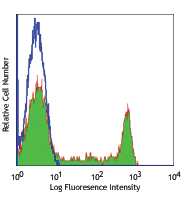
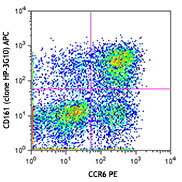
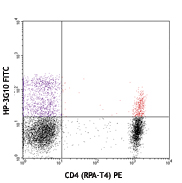
Compare Data Across All Formats
This data display is provided for general comparisons between formats.
Your actual data may vary due to variations in samples, target cells, instruments and their settings, staining conditions, and other factors.
If you need assistance with selecting the best format contact our expert technical support team.
-
Purified anti-human TCR Vα7.2
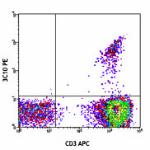
Human peripheral blood lymphocytes stained with CD3 APC and ... 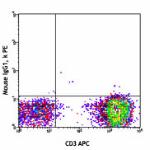
-
FITC anti-human TCR Vα7.2
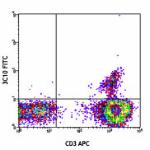
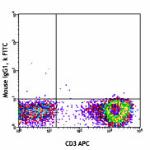
-
PE anti-human TCR Vα7.2

Human peripheral blood lymphocytes stained with CD3 APC and ... 
-
APC anti-human TCR Vα7.2
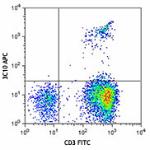
Human peripheral blood lymphocytes were stained with CD3 FIT... 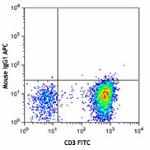
-
PerCP/Cyanine5.5 anti-human TCR Vα7.2

Human peripheral blood lymphocytes were stained with CD3 APC... -
PE/Cyanine7 anti-human TCR Vα7.2

Human peripheral blood lymphocytes were stained with CD3 FIT... -
APC/Cyanine7 anti-human TCR Vα7.2

Human peripheral blood lymphocytes were stained with anti-hu... -
Brilliant Violet 421™ anti-human TCR Vα7.2
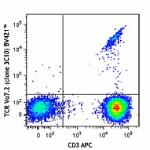
Human peripheral blood lymphocytes were stained with CD3 APC... 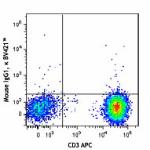
-
Brilliant Violet 510™ anti-human TCR Vα7.2
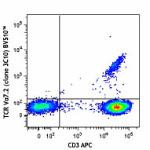
Human peripheral blood lymphocytes were stained with CD3 APC... 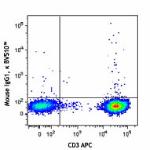
-
Brilliant Violet 605™ anti-human TCR Vα7.2
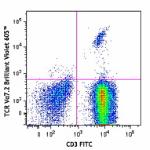
Human peripheral blood lymphocytes stained with CD3 FITC and... 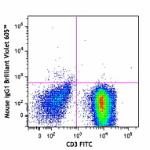
-
Brilliant Violet 785™ anti-human TCR Vα7.2
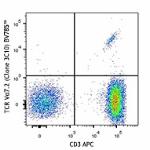
Human peripheral blood lymphocytes were stained with CD3 APC... 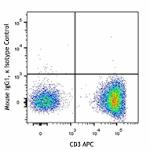
-
Biotin anti-human TCR Vα7.2
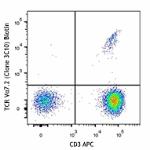
Human peripheral blood lymphocytes were stained with CD3 APC... 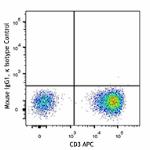
-
Alexa Fluor® 647 anti-human TCR Vα7.2
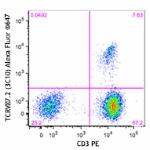
Human peripheral blood lymphocytes were stained with CD3 PE ... 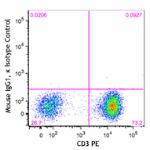
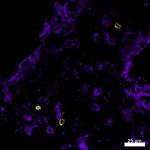
Confocal image of human lymph node sample acquired using the... -
Alexa Fluor® 700 anti-human TCR Vα7.2
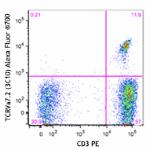
Human peripheral blood lymphocytes were stained with CD3 and... 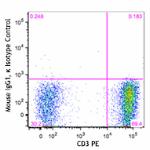
-
PE/Dazzle™ 594 anti-human TCR Vα7.2
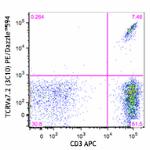
Human peripheral blood lymphocytes were stained with CD3 APC... 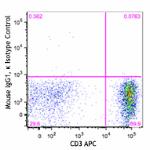
-
Brilliant Violet 711™ anti-human TCR Vα7.2
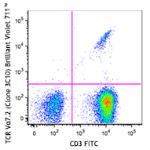
Human peripheral blood lymphocytes were stained with CD3 FIT... 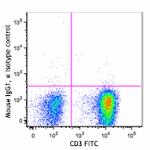
-
TotalSeq™-A0581 anti-human TCR Vα7.2
-
TotalSeq™-C0581 anti-human TCR Vα7.2
-
TotalSeq™-B0581 anti-human TCR Vα7.2
-
Spark Red™ 718 anti-human TCR Vα7.2 (Flexi-Fluor™)
-
Spark Blue™ 574 anti-human TCR Vα7.2 (Flexi-Fluor™)
-
Spark Blue™ 550 anti-human TCR Vα7.2 (Flexi-Fluor™)
 Login / Register
Login / Register 









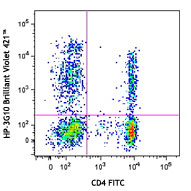



Follow Us